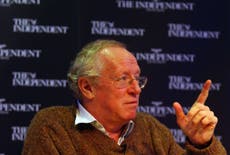Fearless and inquisitive, Robert Fisk was the best of The Independent and independent journalism
The Independent’s Middle East correspondent, who has died aged 74, had a deep and abiding interest in the history and culture of the region which infused everything he wrote


For anyone at the The Independent, or indeed in journalism anywhere, Robert Fisk was a hero. He was sometimes a little stubborn and eccentric, and he had his detractors, naturally enough. Yet he deserved his reputation both as a reporter who knew a story when he sniffed it, and as a “writer”, if that’s not too pretentious a term. He was possessed of a vast knowledge of anything he took an interest in — something of a polymath, in fact — and gave mellifluous voice to his opinions, which he never sought to conceal (and rightly so.) He was the best of The Independent and independent journalism.
Fisk was one of the few hacks I ever knew who referred to himself in the third person — as in “well, what would Old Fisk say about that?” In his case it was indulged gladly because we — his commissioning editors and his vast audience of readers, from presidents and emirs down — really did want to know what Old Fisk had to say. Plus, he could be pretty charming if he wanted.
His views, whether on the page or round a dinner table were always informed and insightful, if sometimes iconoclastic. When, for example, the supposedly cuddly president Barack Obama ordered the assassination of Osama bin Laden in May 2011, Fisk dismissed this massive “news event” as “irrelevant”. It was an audacious “hot take", as we’d say these days, but true. As Fisk pointed out, bin Laden had done what he set out to do: “like the nuclear scientists, he invented the bomb”. Islamist terror did not die with him.
The three prescient interviews Fisk conducted with bin Laden in the 1990s — long before he became America’s Most Wanted — made his career, and for a reason: Fisk got it right. Here was a man, little known, emerging from a successful war in Afghanistan with the Russians who thought he could beat America, too. Bin Laden was worth seeking out and listening to because of the threat he represented. Bin Laden, for his part, told America’s leaders to read what “Mr Robert” was saying about the Middle East. Journalists usually enjoy flattery, and irony, and it doesn’t get much ironically richer than that.
I recall very well, too, the other stories Fisk brought in, world exclusives. Some stick in the mind as exemplars of journalistic nous, an extreme inquisitiveness. When Fisk nailed Nato for killing civilians during the civil war in the former Yugoslavia, he took the trouble to go and find the remains of the missiles and discovered charred componentry that could be traced back to the American manufacturers. The Indy’s subs gave him a great headline for the story, too: “The atrocity is still a mystery to Nato. Perhaps I can help...” That was smart journalism, and it got him an award, one of very many.
His deep and abiding interest in the history and culture of the Middle East — he’d lived in Lebanon for roughly half his life — infused everything he wrote, and not least his 1,286 page personal testament The Great War for Civilisation. He spoke Arabic, rare enough even for correspondents based there, but he lived Arabic too, so to speak.
As a personal memory, I admired his championing of the cause of the Armenian people, victims of the first Holocaust, as Fisk insisted it be capitalised. On his occasional trips into the office he would tell us about his adventures, putting more detail into sketchy stories relayed over dodgy phone lines, such as when he found himself almost stoned to death by Afghan refugees (ironically enough) in Pakistan. Characteristically, he was on the side of the refugees.
He was a genuinely brave man, which just added to his lustrous global reputation. That went for standing up to the big beasts of Fleet Street, too. When he found that the legendary John Junor, editor of the mighty Daily Express, wasn’t giving his reporter the attention he deserved, Fisk walked. He did the same to Rupert Murdoch when he suspected his editors at The Times were emasculating his reporting, second guessing what Murdoch wanted to publish. It was then, in the late 1980s, that Fisk approached The Independent. He found its editors rather more congenial, and supportive. As Andreas Whittam Smith, our founding editor, told us, The Independent respects its readers and trusts its writers. In turn, we rather appreciated our international star.
Whenever, seemingly, I bumped into anyone from the Middle East at some reception or futile round table about peace or something, they’d ask me if I knew Robert Fisk. What a question! How could anyone not?


Join our commenting forum
Join thought-provoking conversations, follow other Independent readers and see their replies